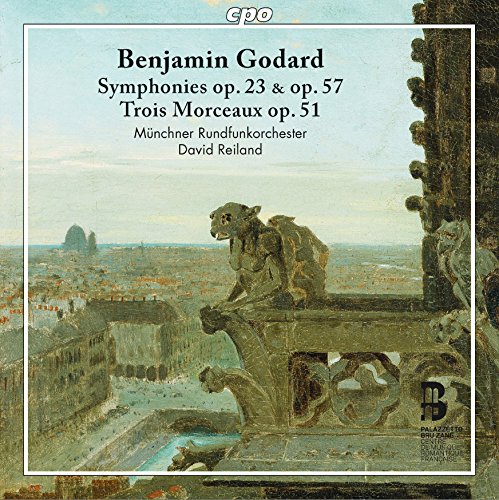GODARD Symphonies No 2. Symphonie gothique
View record and artist detailsRecord and Artist Details
Composer or Director: Benjamin (Louis Paul) Godard
Genre:
Orchestral
Label: CPO
Magazine Review Date: 07/2016
Media Format: CD or Download
Media Runtime: 69
Mastering:
DDD
Catalogue Number: CPO555 044-2

Tracks:
| Composition | Artist Credit |
|---|---|
| Symphony No 2 |
Benjamin (Louis Paul) Godard, Composer
Benjamin (Louis Paul) Godard, Composer David Reiland, Conductor Munich Radio Orchestra |
| Symphonie gothique |
Benjamin (Louis Paul) Godard, Composer
Benjamin (Louis Paul) Godard, Composer David Reiland, Conductor Munich Radio Orchestra |
| Trois Morceaux |
Benjamin (Louis Paul) Godard, Composer
Benjamin (Louis Paul) Godard, Composer David Reiland, Conductor Munich Radio Orchestra |
Author: Tim Ashley
The Gothique was popular in its day, while audiences professed themselves fazed by Op 57, which nowadays strikes us, ironically, as the more conventional work – a standard four-movement structure, written for a Schumann-size orchestra, the first subject of its first movement sounding curiously like its equivalent in Dvořák’s New World. The Gothique is more suite than symphony, though its self-conscious archasisms, gesturing towards medieval and Baroque music, marked it out as appealingly exotic for its first listeners. The Op 51 Morceaux, meanwhile, were not originally written as a set, and were also variably received. The opening ‘Marche funèbre’, more elegy than ceremonial, seemingly drew a blank, while the breezy ‘Brésilienne’ and the more substantial ‘Kermesse’ – a big Ländler in rondo form – enjoyed considerable success.
David Reiland and the Munich Radio Orchestra present us with stylish, idiomatic performances of all three works, handsomely recorded and scrupulously played; there’s a nice sheen on the strings, and the woodwind are superb throughout. But it’s still easy to have mixed feelings about the works themselves. As the Godard revival gathers pace, one notices just how far his deep distrust of Wagner’s influence on French music dictated his own strengths and weaknesses. It resulted, for instance, in songs of great directness and immediacy of impact. But on this showing, it also made him a rather reticent symphonist, discreet and somewhat retro. Taking Schumann and Mendelssohn as models, he has their grace but only intermittently captures their drama. It’s a beautifully presented disc, but you still might find it something of an acquired taste.
Discover the world's largest classical music catalogue with Presto Music.

Gramophone Digital Club
- Digital Edition
- Digital Archive
- Reviews Database
- Full website access
From £8.75 / month
Subscribe
Gramophone Full Club
- Print Edition
- Digital Edition
- Digital Archive
- Reviews Database
- Full website access
From £11.00 / month
Subscribe
If you are a library, university or other organisation that would be interested in an institutional subscription to Gramophone please click here for further information.




